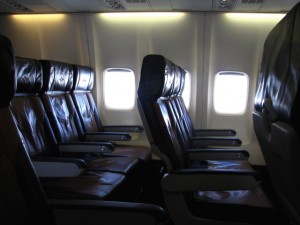A ticket isn't the same as a seat. As airline passengers have learned, having a ticket isn't the same as having a confirmed seat. In 2011, nearly one-third of physicians said they wouldn't accept new Medicaid patients because of payment issues; a smaller number of doctors have said the same thing about Medicare patients. Even with some private plans, you may be on permanent standby because the doctor of your choice does not accept your health plan.
Your private jet is ready. Of course, when money is no object, there are those who rate the equivalent of a private jet. That group would include individuals paying a reported $6,000 to $27,000 a month for "boutique" services like Guardian 24/7 (whose one-page public website simply says, "By Invitation Only"), World Clinic and PinnacleCare Private Health Advisory.
Business class. Unlike Medicaid "recipients," Medicare "beneficiaries" start off with a generous benefit at a modest price and can easily upgrade. They can choose a Medicare Advantage plan in which the average enrollee receives additional benefits and reduced cost-sharing. In addition, Medigap plans provide wrap-around coverage to pay costs traditional Medicare doesn't.
Also traveling business class are those participants in the fast-dwindling number of health plans provided by unions, municipal employers or private companies where the worker contribution is minimal and benefits are generous.
Coach, but some people get better seats and prices. Patients with traditional Medicare coverage, a recent study found, are more likely than those with private health insurance to get needed care, to avoid access problems due to cost, and to be satisfied with their coverage. Medicare even reduces racial and ethnic disparities in access and drug expenditures.
But being a high-wage worker with a good employer-sponsored plan also is a great way to get a good ticket. A new Kaiser Family Foundation survey found that workers at businesses with more low-wage employees paid an average of nearly $1,000 more for their share of premiums than workers in a high-wage environment.
Workers at small firms face higher cost sharing, including higher copayments and higher deductibles, and may face a greater premium contribution, the KFF survey found. Think of it as a high-cost ticket and maybe a middle seat, to boot. In that same vein, the health overhaul's ban on insurers using pre-existing condition information to refuse coverage or raise prices doesn't take effect until 2014, which affects today's self-employed workers who are older and have families. Those workers can find themselves paying much more than the $15,745 average premium cost for family coverage under an employer plan. State plans for high-risk individuals who are otherwise uninsurable typically are high priced and full of restrictions.
Sorry, your flight has been delayed. Of course, even sitting in first class doesn't mean your flight won't have mechanical problems or a rough landing. Similarly, the most comprehensive insurance is no guarantee of high-quality, safe and appropriate care.
A new ticketing system? For all the inconveniences of the current health insurance system, it is at least familiar. However, both the public and private sectors have plans to shake up the shopping-for-insurance process as has happened in the era of deregulated airlines.
Unlike with airline tickets, however, consumer choices in health care can lead to consequences that truly are non-changeable and non-refundable. Whether the industry turmoil leads to more Americans getting a better "seat" at a better price remains to be seen.
Michael L. Millenson is a Highland Park, Illinois-based consultant, a visiting scholar at the Kellogg School of Management and the author of Demanding Medical Excellence: Doctors and Accountability in the Information Age.
